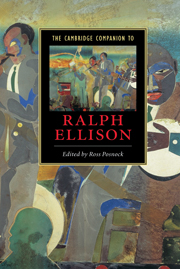Book contents
- Frontmatter
- Introduction
- 1 Ralph Ellison’s invented life
- 2 Ellison and the black Church
- 3 Ellison, photography, and the origins of invisibility
- 4 Ralph Ellison’s music lessons
- 5 Ralph Ellison’s constitutional faith
- 6 Ralph Ellison and the politics of melancholia
- 7 Invisible Ellison
- 8 Ellison’s experimental attitude and the technologies of illumination
- 9 Female iconography in Invisible Man
- 10 Chaos not quite controlled
- 11 Ralph Ellison, Hannah Arendt, and the meaning of politics
- 12 Dry bones
- Selected bibliography and suggestions for further reading
- Index
- Series List
11 - Ralph Ellison, Hannah Arendt, and the meaning of politics
Published online by Cambridge University Press: 28 May 2006
- Frontmatter
- Introduction
- 1 Ralph Ellison’s invented life
- 2 Ellison and the black Church
- 3 Ellison, photography, and the origins of invisibility
- 4 Ralph Ellison’s music lessons
- 5 Ralph Ellison’s constitutional faith
- 6 Ralph Ellison and the politics of melancholia
- 7 Invisible Ellison
- 8 Ellison’s experimental attitude and the technologies of illumination
- 9 Female iconography in Invisible Man
- 10 Chaos not quite controlled
- 11 Ralph Ellison, Hannah Arendt, and the meaning of politics
- 12 Dry bones
- Selected bibliography and suggestions for further reading
- Index
- Series List
Summary
Bringing Ellison and Arendt together could well comprise a chapter on yet another failed interaction between black and Jewish intellectuals. After all, on the two occasions when Ellison publically mentions Arendt it is in a less than favorable light. At the start of ''The World and the Jug,'' his compelling skewering of Irving Howe, Ellison remarks that Howe's earlier critique of Ellison is ''written with something of the Olympian authority that characterized Hannah Arendt's 'Reflections on Little Rock''' in the Winter 1959 issue of Howe's Dissent. Ellison is referring to her notorious misreading of black parents' attempts at integrating segregated grade schools as a parvenu effort at social climbing. Ellison's phrase ''Olympian authority'' should not be construed as a compliment; it is his sarcastic euphemism for the arrogance of those such as Howe and Arendt ''who would tell us the meaning of Negro life'' without ever bothering ''to learn how varied it really is.'' ''Evidently Howe feels that unrelieved suffering is the only 'real' Negro experience, and that the true Negro writer must be ferocious'' (Collected Essays 159).
- Type
- Chapter
- Information
- The Cambridge Companion to Ralph Ellison , pp. 201 - 216Publisher: Cambridge University PressPrint publication year: 2005
- 6
- Cited by

